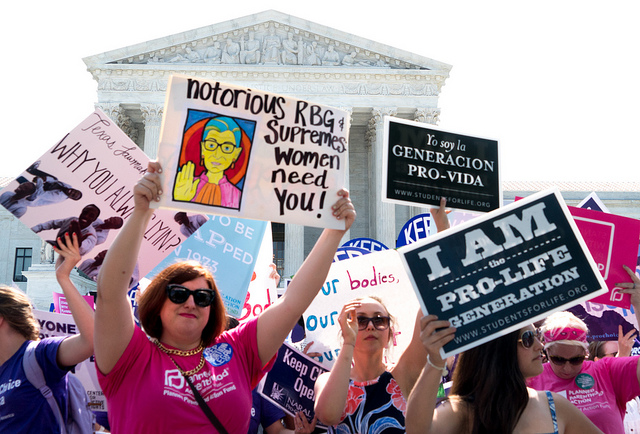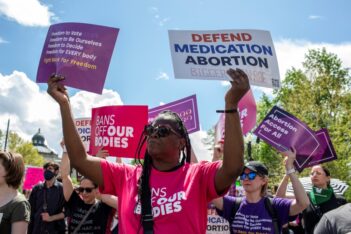
In a 5-3 decision, the Justices declare Texas’s health care regulations on abortion to be unconstitutional.
State abortion laws around the United States may be due for an overhaul. Late last month, the U.S. Supreme Court struck down a Texas law that restricted women’s access to in-state abortion services. In Whole Woman’s Health v. Hellerstedt, the Supreme Court considered and ultimately rejected two provisions of a Texas law because the Court found that it violated women’s constitutional right to obtain an abortion.
The Texas law, known as House Bill 2 (H.B. 2), contained two provisions that were at issue in the case: an “admitting privileges requirement” and a “surgical center requirement.” In the Supreme Court’s 5-3 decision, the majority reasoned that both provisions were unconstitutional because they provided “few, if any health benefits for women” and placed a “substantial obstacle” in the path of women seeking abortions.
Whole Woman’s Health, which operated five clinics in Texas before the state law became effective in 2013, argued that both the “admitting privileges requirement” and “surgical center requirement” served to impede access rather than improve patient health. Whole Woman’s Health claimed that, although it was personally forced to close two of its clinics because of the law, its experiences actually reflected a dangerous trend in Texas, where 75 percent of all abortion facilities within the state were at risk of closing due to H.B. 2.
Before H.B. 2, Texas required doctors at abortion clinics to either have admitting privileges at a local hospital, or a “working arrangement” with a physician who did. H.B. 2 altered this requirement, mandating doctors at abortion clinics to personally have admitting privileges at a hospital within a 30-mile radius of the clinic. As noted by the Society of Hospital Medicine in a brief supporting Whole Woman’s Health, admitting privileges, which allow doctors to admit patients into a hospital for treatment, are often conditioned on doctors “reaching a certain number of admissions per year.” In the case of most abortion procedures, which are typically low-risk and do not lead to hospitalization, the chance that a clinic doctor sends enough patients to a nearby hospital to gain admitting privileges is slim.
Whole Woman’s Health further challenged the “surgical center requirement”—which compelled abortion clinics to meet the same minimum standards as surgical centers—asserting that sterile scrub facilities, extra-wide hallways designed for stretchers, and other requirements were inappropriate for many abortion clinics.
In response, the State of Texas argued that its admitting privileges and surgical center requirements were needed to improve the standard of care for abortion patients, and that they produced valid medical benefits for women and were designed to prevent incidents like that involving the Kermit Gosnell-operated clinic in Philadelphia. In a case that garnered widespread media attention, Gosnell, a onetime physician, was found guilty in May 2013 of several counts of murder for performing unsafe abortions in a dilapidated clinic that prosecutors reportedly called a “house of horrors.”
Texas contended that, although some clinics would inevitably close as a result of H.B. 2, over 90 percent of Texan women of reproductive age would still live within a 150-mile radius of the remaining operational clinics.
During oral argument before the Supreme Court, Justice Stephen Breyer challenged this aspect of the state’s argument, asking whether the 150-mile travel distance would result in “more or fewer women who die of complications due to an effort to create an abortion.”
In the end, a majority of the Justices agreed with Whole Woman’s Health and held that both requirements placed an undue burden on the constitutional right of women to seek abortions.
Three Justices dissented, with Chief Justice John Roberts and Justice Clarence Thomas joining a dissent authored by Justice Alito.
Justice Samuel Alito disputed the Court’s holding mainly for procedural reasons, arguing that Whole Woman’s Health had brought the same issue before in a separate case, lost, and chose not to appeal, thus forfeiting any right to a rematch. In particular, Justice Alito criticized the majority for its perceived flouting of procedural rules, stating that “when a case involves a controversial issue, we should be especially careful to be scrupulously neutral in applying such rules.”
Due to the majority’s decision, it is estimated that approximately 5.4 million women of reproductive age in Texas will be better able to seek abortion services. However, the decision will almost certainly have a ripple effect on other states with similar restrictions on abortion clinics. Virtually identical abortion laws in states such as Alabama, Wisconsin, Mississippi, and Louisiana are now essentially voided, with Alabama’s Attorney General reportedly conceding that “there is no good faith argument that Alabama’s law remains constitutional in light of the Supreme Court ruling.”
The Court’s decision in Whole Woman’s Health remains a critical victory for pro-choice advocates. Shortly after the Court handed down its ruling, Amy Hagstrom Miller, the founder of Whole Woman’s Health, remarked that “with this historic ruling, justice has been served and our clinics can stay open.”
This essay is part of The Regulatory Review’s seven-part series, The Supreme Court’s 2015 Regulatory Term.
The image of Supreme Court demonstrators is the property of the Victoria Pickering and is used under a Creative Commons License.



